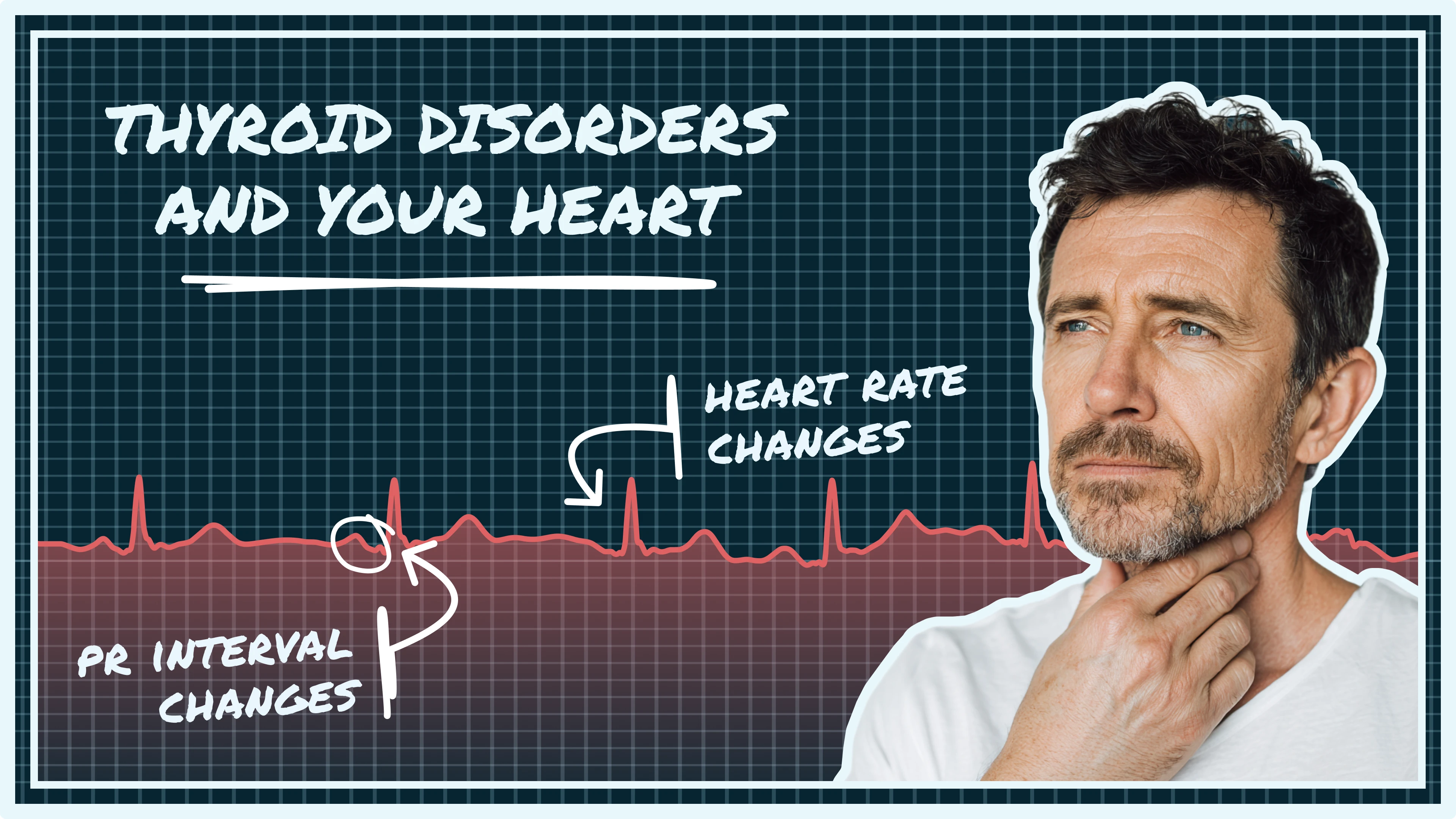Key Takeaways
Your thyroid gland, a small butterfly-shaped organ located in your neck, plays a surprisingly significant role in regulating your heart health. The hormones it produces influence nearly every cell in your body, including those in your heart. When thyroid hormone levels are out of balance, it can lead to a variety of cardiovascular issues, many of which are detectable on your ECG.
How Thyroid Hormones Affect the Heart
Thyroid hormones, primarily thyroxine (T4) and triiodothyronine (T3), directly affect the heart in several ways. They influence heart rate, the strength of heart muscle contractions, blood pressure, and even the electrical conduction system of the heart. Think of thyroid hormones as the conductors of your heart's orchestra; when they're in tune, your heart performs beautifully, but when they're off-key, the rhythm can suffer.
Because of this direct influence, thyroid disorders can manifest with a range of cardiovascular symptoms, from palpitations and shortness of breath to more serious conditions like arrhythmias and heart failure. Your ECG can provide valuable clues about how your thyroid health is impacting your heart, making it an important diagnostic tool in these cases.
Hyperthyroidism: When Your Thyroid is Overactive
Hyperthyroidism, a condition where your thyroid gland produces too much thyroid hormone, can put your heart into overdrive. It's like constantly running a marathon without resting. The excess thyroid hormone directly stimulates the heart, leading to a hyperdynamic circulatory state.
Common ECG Changes in Hyperthyroidism:
- Sinus Tachycardia: This is the most common ECG finding in hyperthyroidism. Your heart rate will be consistently fast (over 100 beats per minute) but with a normal rhythm originating from the sinus node. This reflects the direct stimulatory effect of excess thyroid hormone on the heart.
- Atrial Fibrillation (AFib): Hyperthyroidism is a significant risk factor for AFib, especially in older individuals. The rapid and irregular electrical activity in the atria, often seen in AFib, is exacerbated by the heightened metabolic state induced by excess thyroid hormones. AFib in hyperthyroidism can be particularly challenging to control and carries an increased risk of stroke.
- Increased P-wave and QRS Amplitude: The stronger contractions of the heart muscle due to hyperthyroidism can sometimes lead to slightly larger P waves (atrial depolarization) and QRS complexes (ventricular depolarization) on the ECG.
- Shortened PR and QT Intervals: While less consistent, some individuals with hyperthyroidism may exhibit a shortened PR interval (time from atrial to ventricular activation) and a shortened QT interval (total time for ventricular depolarization and repolarization). These changes reflect the accelerated electrical activity of the heart.

Symptoms of Hyperthyroidism:
Beyond cardiac symptoms, hyperthyroidism can cause weight loss despite increased appetite, nervousness, tremors, heat intolerance, excessive sweating, and changes in bowel habits. If you experience these symptoms along with palpitations or a racing heart, it's crucial to get your thyroid function checked.
Hypothyroidism: When Your Thyroid is Underactive
Hypothyroidism, where your thyroid gland produces too little thyroid hormone, can slow down your body's metabolic processes, including those of your heart. It's like your heart is trying to run through molasses.
Common ECG Changes in Hypothyroidism:
- Sinus Bradycardia: The most common ECG finding in hypothyroidism is a slow heart rate (below 60 beats per minute) with a normal rhythm. This reflects the decreased metabolic rate and reduced stimulation of the heart by thyroid hormones.
- Low Voltage QRS Complexes: The QRS complexes on the ECG may appear smaller than normal, indicating reduced electrical activity in the heart muscle. This can be due to fluid accumulation around the heart (pericardial effusion) or changes in the heart muscle itself.
- Prolonged PR and QT Intervals: Hypothyroidism can lead to a prolonged PR interval and, more significantly, a prolonged QT interval. A prolonged QT interval is a concern because it increases the risk of a dangerous arrhythmia called Torsades de Pointes.
- T-wave Flattening or Inversion: The T waves, which represent ventricular repolarization, may appear flattened or even inverted in some leads, reflecting changes in the heart muscle's electrical recovery.

Symptoms of Hypothyroidism:
In addition to cardiac symptoms like a slow heart rate or fatigue, hypothyroidism can cause weight gain, fatigue, cold intolerance, dry skin, hair loss, constipation, and depression. If you experience these symptoms, especially with a persistently slow heart rate, consult your doctor for thyroid testing.
Why is Thyroid Monitoring Important for Heart Health?
Early detection and treatment of thyroid disorders are crucial for preventing or reversing their cardiovascular complications. Untreated hyperthyroidism can lead to heart failure, especially in individuals with pre-existing heart disease. Untreated hypothyroidism can contribute to high cholesterol, high blood pressure, and eventually heart failure.
Regular monitoring of thyroid function, especially if you have a family history of thyroid disease or are experiencing symptoms, can help catch imbalances early. Your doctor will typically order blood tests to measure Thyroid Stimulating Hormone (TSH), and if abnormal, free T4 and T3 levels.
Conclusion
That brings us to the end of our guide on how thyroid health can affect your ECG. We hope it gave you a clearer understanding of the connection between your thyroid hormones and your heart’s rhythm - and how changes in one can show up in the other. If you’re still feeling uncertain about what your ECG is showing or how your thyroid might be playing a role, you’re not alone. That’s exactly why we built the Qaly app. On Qaly, human experts review your ECG recordings and help you make sense of the patterns, giving you peace of mind and confidence in your heart health.
To get started, download the Qaly app from the App Store or Play Store. And if you ever need support, we’re always here at support@qaly.co.
From all of us at Qaly, stay informed and heart healthy ❤️
Have a thyroid condition? Qaly experts review your ECGs and help you see how it may affect your heart. Start monitoring today.










.png)
.png)